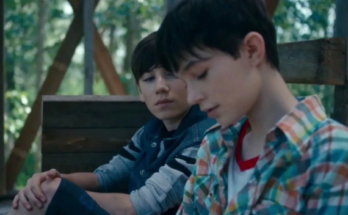Last Summer (2013)
Last Summer is a gripping coming-of-age drama that takes its viewers on an emotional journey through the innocence and heartbreak of youth, the complexities of love, and the inevitable loss of innocence. Set against the backdrop of a sleepy beach town, the film beautifully captures the fleeting moments of summer, and the profound impact they can have on a young person’s life. With its rich storytelling, compelling performances, and haunting visuals, Last Summer explores themes of friendship, desire, and the consequences of youthful recklessness.

Plot Summary: The story follows three close-knit friends—Jake, Sam, and Lily—who spend every summer together at a quiet seaside town, where they have forged a bond that has lasted through their childhood. As the summer of 2013 approaches, their relationships begin to shift as they face new challenges in their lives, including the arrival of a stranger in town that stirs up unexpected emotions and conflicts.
Jake, who has always been the quiet observer of the group, is struggling with the recent death of his mother, while Sam, the charming and carefree one, is beginning to grapple with his own identity and what he wants from life. Lily, the only female in the trio, finds herself torn between her loyalty to her friends and the growing, complex feelings she has for Jake. As their personal tensions rise, so do the stakes of their friendships, and what was once a carefree, innocent time in their lives turns into something darker and more complicated.
As the summer progresses, the trio embarks on a journey of self-discovery, love, and loss, leading them to confront the reality that not everything can stay the same. The relationships that once seemed so simple begin to unravel, with each character realizing that the decisions they make during this one summer will forever shape the people they become.

Artistic Analysis: Last Summer is an artful exploration of the emotional and psychological effects of growing up. The cinematography is breathtaking, using the beach town setting to emphasize both the beauty and the melancholy of the summer months. The quiet, slow-moving shots of the beach, the ocean waves, and the golden light of dusk serve as metaphors for the fleeting nature of time and youth. The juxtaposition between the tranquil setting and the intense emotional turmoil of the characters creates a striking contrast, reflecting the inner conflicts that brew beneath the surface.
The use of color is also notable, with the warm, sun-soaked scenes capturing the carefree innocence of childhood, while cooler, more muted tones are used to signify the deeper, darker moments in the characters’ journeys. The pacing is deliberate and reflective, allowing the emotional weight of each scene to resonate, and letting the audience experience the transformation of the characters in real-time.

Performances: The cast delivers a stunning set of performances, with each actor bringing depth and authenticity to their role. The portrayal of Jake, the quiet and introspective character, is a highlight, as the actor beautifully captures the complexity of a person dealing with grief, self-doubt, and a growing sense of responsibility. Sam, the charming yet troubled friend, brings a sense of unpredictability and youthful energy to the film, making his internal conflicts even more relatable and heart-wrenching.
Lily, the only female in the trio, shines as a character who is both strong and vulnerable. Her character arc is perhaps the most poignant, as she navigates the shifting dynamics of her friendships and her own evolving feelings of love and desire. The chemistry between the three leads is palpable, and their performances allow the audience to feel the depth of their relationships and the pain of their eventual unraveling.

Emotion: Last Summer is an emotionally charged film that doesn’t shy away from the complexity of growing up. The film explores the messy, often painful nature of relationships, particularly during that crucial period when childhood innocence gives way to adulthood’s harsh realities. Themes of love, heartbreak, and loss are examined through the lens of youthful friendships, and the film beautifully portrays how one summer can change everything.
There are moments of pure joy and blissful freedom, as the characters experience the thrill of first love and the carefree nature of summer. However, these moments are juxtaposed with the weight of unspoken emotions, hidden desires, and inevitable consequences. The film resonates deeply because it doesn’t romanticize youth or sugarcoat the emotional challenges that come with it—instead, it shows the beauty and the pain of growing up, making it both an uplifting and heart-wrenching experience.

Final Thoughts: Last Summer is a beautifully crafted and emotionally resonant film that offers a raw, honest portrayal of the complexities of youth, friendship, and love. The film’s strength lies in its ability to capture the quiet moments of growth and transformation that define who we become, while also exploring the fleeting nature of time and the inevitability of change. With its strong performances, evocative cinematography, and deeply moving story, Last Summer is a film that lingers long after it ends, reminding us of the power of those defining moments in life that shape us forever. Whether it’s the joy of discovering who you are, the pain of losing innocence, or the realization that summer doesn’t last forever, Last Summer is a poignant reflection on the bittersweetness of youth and the passage of time.



